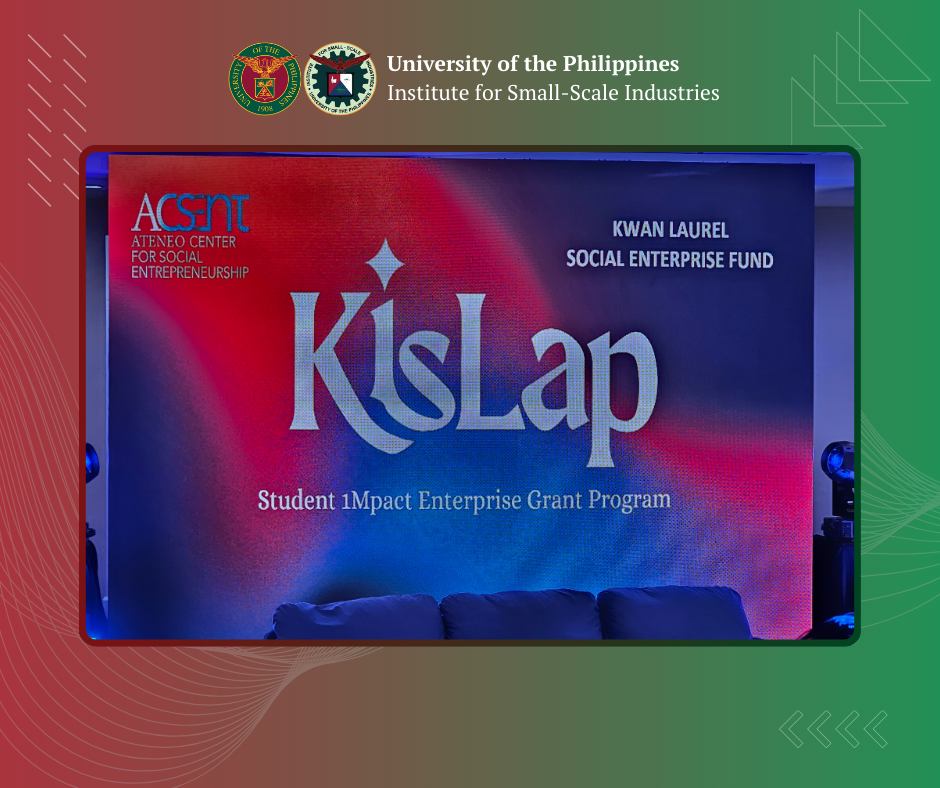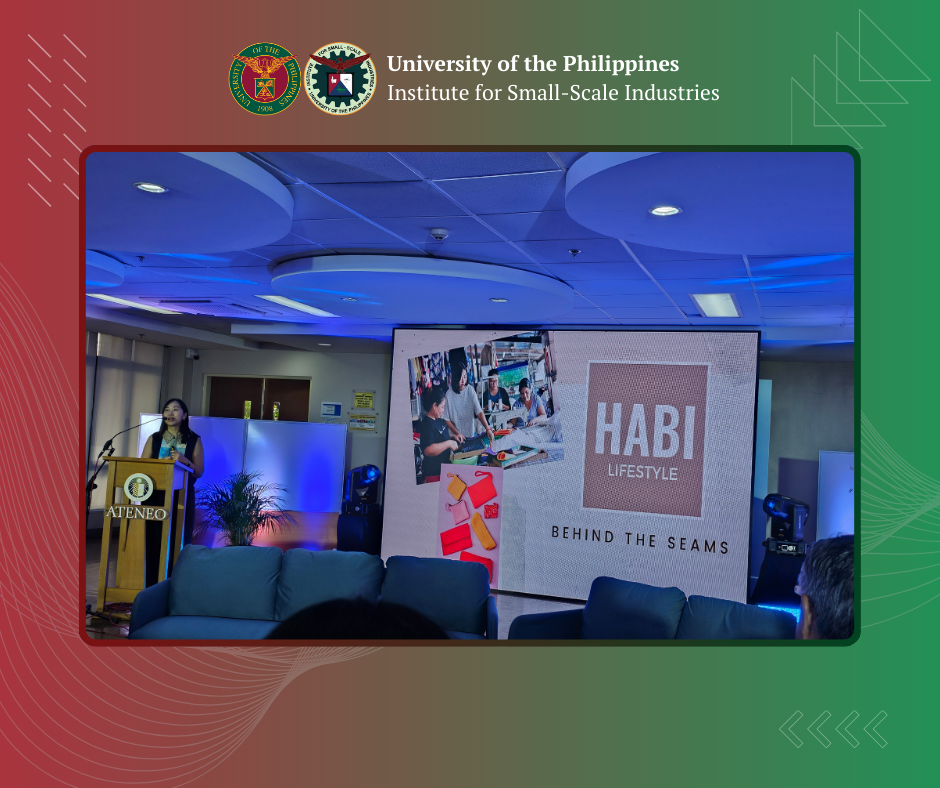KISLAP: Igniting Student Ideas Into Impact-Driven Enterprises

In the Philippines, many students dream of becoming entrepreneurs with bright business ideas aimed at addressing poverty, inequality, or environmental degradation. Yet most of these ideas never make it beyond the classroom because of lack of funding and support. What begins as a promising concept—often developed in courses, immersion programs, or volunteer work—too often fades without the resources to grow into an enterprise that can truly make a difference.
The Kislap-Kwan Laurel Grant for Social Enterprises, launched on September 25 for Ateneo students, was created precisely to bridge this gap. Established by the Kwan Laurel family and administered by the Ateneo Center for Social Entrepreneurship (ACSENT), the initiative ensures that student-led start-ups are not left at the idea stage. Through a combination of financial support, mentorship, incubation, and access to experts across disciplines—management, engineering, sociology, design, and law—Kislap empowers students to turn their bright business ideas into impact-driven enterprises.
For the ISSI community—MSMEs navigating similar challenges, UP students who may look to replicate such models, social enterprise enthusiasts seeking inspiration, and policymakers shaping enabling environments—Kislap stands as a fresh source of inspiration. It shows what is possible when institutions believe in the potential of young entrepreneurs and match their passion with resources: student ideas can spark enterprises that uplift communities and advance inclusive development.
Why Support Student-Led Enterprises?
Across the world, universities are increasingly becoming hubs for innovation, where students not only learn theories but also create real-world solutions. This is especially important in the Philippine context. Through university-sponsored immersion and service-learning programs, students are regularly exposed to the country’s deepest social realities.
At the University of the Philippines, for instance, the Ugnayan ng Pahinungod has long provided avenues for students to work alongside marginalized communities in education, health, and livelihood projects. Ateneo de Manila University, on the other hand, runs programs such as the Loyola Schools Alternative Socio-Cultural Involvement Program (LAS Program) and the Junior Engagement Program (JEEP), which bring students face-to-face with urban poor communities, farmers, fisherfolk, and grassroots organizations.
These experiences often spark in students a deep awareness of poverty, inequality, and environmental challenges. They see firsthand how families struggle to make ends meet, how informal workers survive with limited protection, and how communities grapple with climate risks and environmental degradation. Many respond by imagining business solutions that are not only practical but also compassionate. These ventures can address the what is called triple bottomline: profit, people, and planet. They can generate livelihood, restore dignity, and protect the environment.
However, without strong institutional support, these sparks of innovation rarely develop into fully formed enterprises. The ideas remain as reflections in immersion journals, outputs in entrepreneurship classes, or proposals for case competitions. What is missing is a sustained mechanism that gives these ideas the chance to grow into real ventures with the potential to create long-term impact.
This is why initiatives like the Kislap–Kwan Laurel Grant for Social Enterprises matter. As Dean Robert Galang of the Ateneo School of Management emphasized, “Why not, instead of just explaining social realities, provide them with actual resources?” Rather than limiting entrepreneurship education to case studies and simulations, Ateneo is giving its students the opportunity to test their ideas, learn from setbacks, and scale solutions with real-world impact.

Incubating Ideas into Impact
The Kislap–Kwan Laurel Grant for Social Enterprises was born out of the conviction that great ideas should not be left to wither in classrooms or journals, but given the chance to take root and grow into enterprises that change lives. Established by the Kwan Laurel family, the grant reflects a commitment to nurture the next generation of Filipino entrepreneurs who are motivated not only by profit but also by purpose.
Administered by the Ateneo Center for Social Entrepreneurship (ACSENT), Kislap is designed as a comprehensive support program for student-led start-ups. It gives a grant of up to ₱1 million each for three selected start-up social enterprises to jumpstart their business at its earliest and most vulnerable stage. The program also provides structured boot camps, one-on-one mentorship, and incubation support to ensure that students are guided as they transform their ideas into viable, impact-driven businesses.
Eligibility is focused on Ateneo students and graduates who are preparing to transition from academic life into the entrepreneurial world. This timing is deliberate to position itself as a take-off platform, encouraging students not to abandon their visions but to pursue them with confidence and concrete backing.
Underlying the grant is a philosophy that entrepreneurship should be about service and impact, not simply wealth creation. As ACSENT Director Ana Tan explains, “In every spark, we strive for the magis, especially to those who need more.” This grounding in the Ignatian tradition means that the enterprises supported by Kislap are envisioned to embody compassion, inclusivity, and sustainability.
The strength of the Kwan Laurel Grant for Social Enterprises lies not only in the funding it provides but in the ecosystem of support that surrounds student entrepreneurs. The grantees gain access to a wide range of institutional resources including expertise of the faculty members. An incubation space is also available, providing students with a dedicated environment where collaboration and innovation can thrive.
Janine Chiong and Habi Lifestyle
Dean Robert Galang noted that the case of Habi Lifestyle, co-founded by Ateneo student Janine Chiong, was a key inspiration for the grant. What began as a campus project, transforming rags into shoes and working with mothers in Payatas, grew into a social enterprise that gained national and international recognition, attracted investors, and created dignified livelihoods. Habi’s journey demonstrated both the potential and the challenges of student entrepreneurs: the difficulty of sustaining momentum, securing funding, and balancing social mission with business realities. By highlighting Habi’s experience, the Kwan Laurel Grant hopes to ensure that more student ventures not only survive but thrive and expand their impact.
It is about shaping a new generation of entrepreneurs grounded in values of magis and service for the common good. It reminds us that entrepreneurship, when oriented toward social impact, can be a force that uplifts families, protects the environment, and reduces inequality.
Why Social Enterprises Matter Beyond Ateneo
Social enterprises are uniquely positioned to address the challenges of poverty, inequality, and environmental degradation. Unlike traditional businesses, they operate with a triple mission—pursuing prosperity while also advancing people and the planet. Yet these challenges are far too complex for the government alone to solve. As the program emphasizes, “Poverty, inequality, and environmental degradation cannot just be solved by the government alone.” It will take partnerships between universities, families, private institutions, communities, and policymakers to build solutions that last.
Both UP ISSI and ACSENT are active members of the Poverty Reduction through Social Entrepreneurship (PRESENT) Coalition, a network of organizations pushing for stronger support systems for social enterprises. The coalition has been advocating for the passage of the PRESENT Bill, which seeks to establish a national program providing incentives, financing, and capacity-building for social enterprises that directly serve poor and marginalized communities.